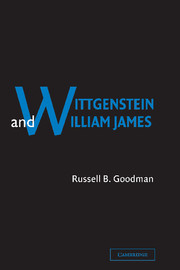Book contents
- Frontmatter
- Contents
- Preface
- Abbreviations
- Introduction
- 1 Varieties of Pragmatic Experience
- 2 Wittgenstein and The Varieties of Religious Experience
- 3 Wittgenstein and The Principles of Psychology: An Introduction
- 4 What Is It Like to Be a Human Being?
- 5 Language and Meaning
- 6 Pragmatism Reconsidered
- Coda
- Notes
- Index
6 - Pragmatism Reconsidered
Published online by Cambridge University Press: 23 July 2009
- Frontmatter
- Contents
- Preface
- Abbreviations
- Introduction
- 1 Varieties of Pragmatic Experience
- 2 Wittgenstein and The Varieties of Religious Experience
- 3 Wittgenstein and The Principles of Psychology: An Introduction
- 4 What Is It Like to Be a Human Being?
- 5 Language and Meaning
- 6 Pragmatism Reconsidered
- Coda
- Notes
- Index
Summary
“Am I not getting closer and closer to saying that in the end logic cannot be described? You must look at the praxis of language, then you will see it”
(OC, 501 [April 11, 1951]).Twice in the last four years of his life – and in quite different contexts – Wittgenstein considers the relation of his philosophy to pragmatism. In Chapter 1, we considered his late epistemological work On Certainty, where Wittgenstein acknowledges that he is “trying to say something that sounds like pragmatism.” I traced how the pragmatic epistemology James and Schiller called “humanism” and Wittgenstein's views in On Certainty run parallel at many points, but also found that important differences stem from Wittgenstein's commitment to logic or grammar, and the importance of skepticism in his account.
The other place where Wittgenstein considers his relation to pragmatism is the typescript, prepared in the fall of 1947, published as Remarks on the Philosophy of Psychology, Volume I. This was a work Wittgenstein composed from several manuscript books. Much of it appears in Part 2 of the Investigations, which was probably finished two years later. In the Remarks, Wittgenstein focuses on psychology and meaning, the two great themes of the Investigations. He also raises the following question and answer: “But you aren't a pragmatist? No. For I am not saying that a proposition is true if it is useful” (RPP, 266).
- Type
- Chapter
- Information
- Wittgenstein and William James , pp. 150 - 171Publisher: Cambridge University PressPrint publication year: 2002



